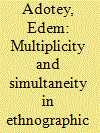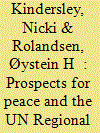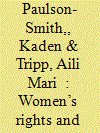|
|
|
Sort Order |
|
|
|
Items / Page
|
|
|
|
|
|
|
| Srl | Item |
| 1 |
ID:
181247


|
|
|
|
|
| Summary/Abstract |
In 2020, Côte d’Ivoire was supposed to turn an important page in its history. Ten years after the end of the war, peace and growth had returned to the country. On 5 March, in Yamoussoukro, Alassane Dramane Ouattara (popularly known as ADO) officially declared that he would not run for another term and would instead ‘make way for a new generation’.1 This decision seemed to cement prospects for post-conflict democratic consolidation at a time when many African countries, especially neighbouring Guinea, were facing serious tensions over the issue of third presidential terms. But the death on 8 July of Amadou Gon Coulibaly, the prime minister and Ouattara’s chosen successor, upended this scenario of generational change. Citing force majeure, Ouattara reneged on his commitment and joined the electoral fray. On 3 November, the Electoral Commission announced his re-election for a third term with 94.27 percent of the vote, a victory confirmed by the Constitutional Council a few days later against a backdrop of widespread violence. In the meantime, opposition leaders, who had called for an ‘active boycott’ of the election and attempted to set up an alternative government, had been thrown into prison, placed under house arrest, or forced into exile. In total, 85 civilians had officially been killed and nearly 500 wounded in the election clashes,2 and more than 8,000 people had fled the country.3
|
|
|
|
|
|
|
|
|
|
|
|
|
|
|
|
| 2 |
ID:
181245


|
|
|
|
|
| Summary/Abstract |
Livestock owners, elites and non-elites alike, from different parts of Namibia fence in land that belongs to the indigenous San people who collectively manage their land as a conservancy. Fencing violates the Communal Land Reform Act of 2002. The conservancy started a lawsuit in August 2013 with reference to this Act to remove the fences and end the illegal occupation of land. The High Court ruled in 2016 in favour of the conservancy, but the fences have not been removed and more illegal settlers have settled in the conservancy. We conceptualize and analyse the act of fencing as land grabbing but argue simultaneously that the legal battle of the conservancy is more than a struggle for justice. The case unfolds as an ontological struggle between actors, their institutions and respective policies and discourses, pivoting on conflicting visions of modernities of (rural) development in Tsumkwe West. The wider significance beyond N≠a Jaqna is that the core of struggles about land and rights in situations of land grabbing is whose modernity counts. The court case has also paved the way for conservancies and other resource communities to become involved in dealing with land issues and contesting the multiple meanings of land.
|
|
|
|
|
|
|
|
|
|
|
|
|
|
|
|
| 3 |
ID:
181246


|
|
|
|
|
| Summary/Abstract |
This research note explores the ethical and methodological implications of using drones for ethnographic research at events that involve simultaneous activities and/or large crowds and large spaces. Based on the methodological challenges of collecting visual data using cameras in the case of royal funerals in Ghana, this note argues that the aerial viewpoint provided by drones could transform visual data collection by capturing sophisticated views of multiple events happening at the same time. However, it also identifies ethical and methodological challenges of using drones and argues that it could obscure the understanding of sociocultural complexities. This research note contributes to our understanding of visual methodologies by highlighting how drone technology extends and complicates current understandings and debates on the use of photographs and films in ethnography.
|
|
|
|
|
|
|
|
|
|
|
|
|
|
|
|
| 4 |
ID:
181248


|
|
|
|
|
| Summary/Abstract |
ON 7 July 2016, A DEADLY CLASH between the guards of the president and vice-president of South Sudan sparked days of skirmishes, purges, looting and abuse of civilians across the capital city of Juba. At least 300 people were killed, including 2 Chinese UN soldiers,1 as soldiers under President Salva Kiir's command used combat helicopters, tanks and other heavy weaponry in the city suburbs.2 Next to a UN peacekeeping base, soldiers raped civilians; in a much-publicized attack on the Terrain Hotel, foreign humanitarian workers were gang raped and beaten.3 Overall, violence displaced about 36,000 people, many thousands of whom are still sheltering inside UN compounds. A contingent of the Sudan People's Liberation Movement/Army in Opposition (SPLM/A-IO) that had arrived in April was killed or driven out of town, and Riek Machar, the first vice president, escaped over land to the Democratic Republic of Congo. In the days following, Uganda evacuated a large number of its citizens in military convoys. The fighting and atrocities in Juba triggered further retaliation and clashes in towns across the country.
|
|
|
|
|
|
|
|
|
|
|
|
|
|
|
|
| 5 |
ID:
181242


|
|
|
|
|
| Summary/Abstract |
There are striking differences between state buildings in Ghana and Côte d’Ivoire and in how citizens living in each country’s capital city think and talk about them. In this article, we explore the degree to which these buildings illustrate very different ideas of statehood in West Africa. We draw on art theories from West Africa to argue that architectural aesthetics rest on juxtapositions of beauty and the sublime and we suggest ways these help establish state meaning. We then apply our aesthetic approach to citizens’ evaluations of their state buildings in Ghana and Côte d’Ivoire and illustrate how differently the approach plays out, in Ghana where the state emerges as acclimatized and relatively robust and in Côte d’Ivoire where the state emerges as idealized and fragile.
|
|
|
|
|
|
|
|
|
|
|
|
|
|
|
|
| 6 |
ID:
181244


|
|
|
|
|
| Summary/Abstract |
Urban renewal is central to ‘world-class’ city aspirations on the African continent: demolitions and evictions exemplify the power of the state to restructure urban space, prioritizing elite forms of accumulation and enforcing aesthetic norms of cleanliness, order and modernity. The ubiquity of world-class city-making has been taken by urban studies scholars as evidence of African leaders’ converging on a unitary aspirational urban imaginary. This article contends that the concept of world class should instead be understood as a key terrain on which African governments’ distinctive and diverse ideational ambitions are expressed. In Oyo State, southwest Nigeria, vernacular political traditions—in this case Yoruba cultural nationalism centred on the ideas of Obafemi Awolowo—were deployed by the state governor to legitimize urban renewal. Drawing on the Yoruba notion that elitism can be ‘generalized’, the cultivation of globalized urban forms was not only a project of becoming ever more homogenously ‘international’ but a historically grounded aspiration to become ever more essentially Yoruba. Thus, beyond commonalities across the discourses used to legitimize neoliberal urban development—world class, international and global—these universal sounding imaginaries may at the same time express much more particularistic political projects.
|
|
|
|
|
|
|
|
|
|
|
|
|
|
|
|
| 7 |
ID:
181243


|
|
|
|
|
| Summary/Abstract |
Women’s rights are being enshrined in African constitutions today to an unprecedented extent. African countries have on average more constitutional provisions addressing women’s rights than any other region of the world. This longitudinal cross-national study shows that constitutional reforms in African contexts are increasingly evident in the areas of gender equality, customary law, discrimination, violence against women, gender quotas, and citizenship rights, and they sometimes reflect gender-inclusive language. By analysing a novel data set of constitutional reforms across all African countries over 68 years (1951–2019), this article identifies four critical junctures when the adoption of women’s rights reforms arose, namely (i) after independence, particularly in Muslim-majority countries; (ii) after political opening in the 1990s; (iii) after the end of major civil conflicts; and (iv) after the 2011 Arab uprisings. At each juncture, women’s movements capitalized on political openings to advance constitutional reforms that are unmatched on a global scale. This article goes beyond the existing explanations of cumulative gains, international influence, diffusion, learning, and borrowing to show that a ‘critical junctures’ approach may help explain when, why, and how women’s rights reforms occur in constitutions.
|
|
|
|
|
|
|
|
|
|
|
|
|
|
|
|
|
|
|
|
|